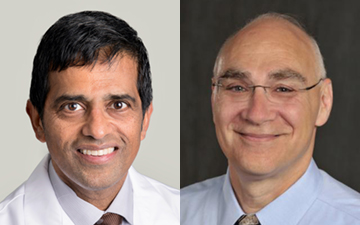EFL066
For our 66th episode, we review a recent Journal of the Endocrine Society (JES) article that looks at the frequency of positive islet antibodies in a population of adults without diabetes. While that may initially seem like an unusual article choice, we found it to be quite helpful in an era where we now have a therapeutic option to delay the onset of clinical type 1 diabetes when we can identify people early enough. That treatment option naturally raises questions about how we can find such patients and the risk of false-positive results with these antibodies. Host Chase Hendrickson, MD, MPH, MHCC, from Vanderbilt University talks with regular contributor Steven D. Wittlin, MD, from the University of Rochester Medical Center, and guest expert Raghu G. Mirmira, MD, PhD, from the University of Chicago. They discuss “Prevalence of Islet Autoantibodies in Adults Without Diabetes” by Pauley et al, published in the August 2025 issue of JES.
Meet the Speakers

Raghu Mirmira, MD, PhD, is a tenured professor of medicine at the University of Chicago, where he serves as director of the National Institutes of Health (NIH)-funded Diabetes Research and Training Center and vice chair for research in the Department of Medicine. A graduate of the University of Chicago’s Medical Scientist Training Program, Dr. Mirmira earned his PhD in biochemistry and molecular biology and his MD with honors before completing residency and fellowship training at the University of California, San Francisco, including a Howard Hughes Physician Postdoctoral Fellowship. Over the past two decades, he has led a translational research program focused on elucidating fundamental mechanisms of β-cell failure in diabetes and translating these insights into therapeutic strategies. His laboratory has defined the roles of β-cell–specific transcription factors in islet development, identified regulatory pathways involving translational control and mRNA stability in β-cell stress responses, and uncovered the proinflammatory roles of 12-lipoxygenase and 12-HETE in diabetes pathogenesis — laying the groundwork for targeted therapeutic development. He also demonstrated how polyamine metabolism and hypusine modification influence β-cell proliferation and survival and has pioneered the development of circulating biomarkers to assess β-cell stress in individuals with or at risk for type 1 diabetes. Dr. Mirmira’s work has appeared in high-impact journals such as The Journal of Clinical Investigation, Cell Metabolism, and Proceedings of the National Academy of Sciences of the United States of America, reflecting both the scientific rigor and translational significance of his contributions. Dr. Mirmira has maintained continuous NIH funding since 2002, including multiple R01 and U01 awards, and has led several training and research infrastructure grants. He was elected to the American Society for Clinical Investigation in 2010 and the American Academy of Pediatrics in 2025 and was honored with the 2023 Albert Renold Award from the American Diabetes Association for his outstanding mentorship and commitment to translational science.
Steven Wittlin, MD, received his medical degree from Sackler School of Medicine, Tel Aviv University, and completed his residency, including serving as chief resident, at Booth Memorial Medical Center in New York. Dr. Wittlin completed his fellowship at New York University. He is a past chief of endocrinology and assistant chairman of medicine at Booth Memorial Medical Center. Currently, he has been professor of medicine at the University of Rochester School of Medicine and Dentistry for more than 26 years. There he also serves as director of diabetes services and clinical director of the Endocrine-Metabolism Division at the University of Rochester Medical Center. Dr. Wittlin’s research interests include diabetes, diabetes technology, and innovative treatments for diabetes. He has published numerous peer-reviewed articles and book chapters and received several teaching awards.
Everything said on the podcast represents individuals’ opinions only and not those of the participants’ institutions or of the Endocrine Society.
Resources
Meet the Host
 Chase Hendrickson, MD, MPH, MMHC, practices general endocrinology at the Vanderbilt University Medical Center, where he is an associate program director for the endocrinology fellowship program. His interests include endocrine education, teaching inferential methods, and quality improvement.
Chase Hendrickson, MD, MPH, MMHC, practices general endocrinology at the Vanderbilt University Medical Center, where he is an associate program director for the endocrinology fellowship program. His interests include endocrine education, teaching inferential methods, and quality improvement.
Subscribe
Stay up to date by copying the following into your podcast player:
https://www.endocrine.org/-/media/endosociety/files/podcasts/efl/efl.xml
Or you can find us on the following streaming services: